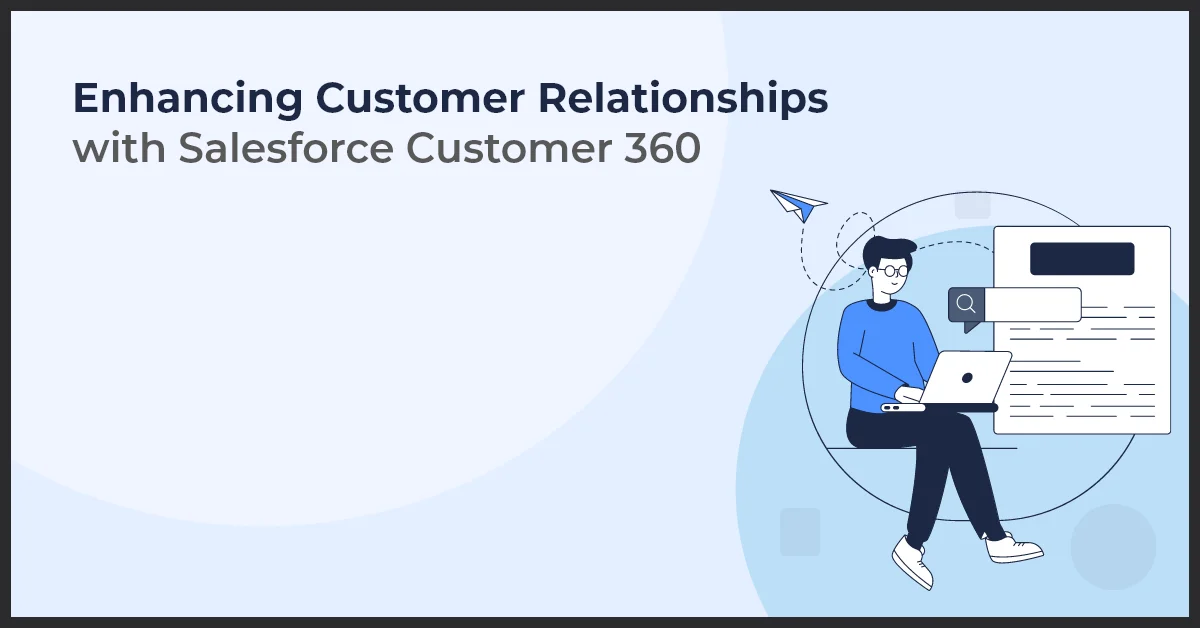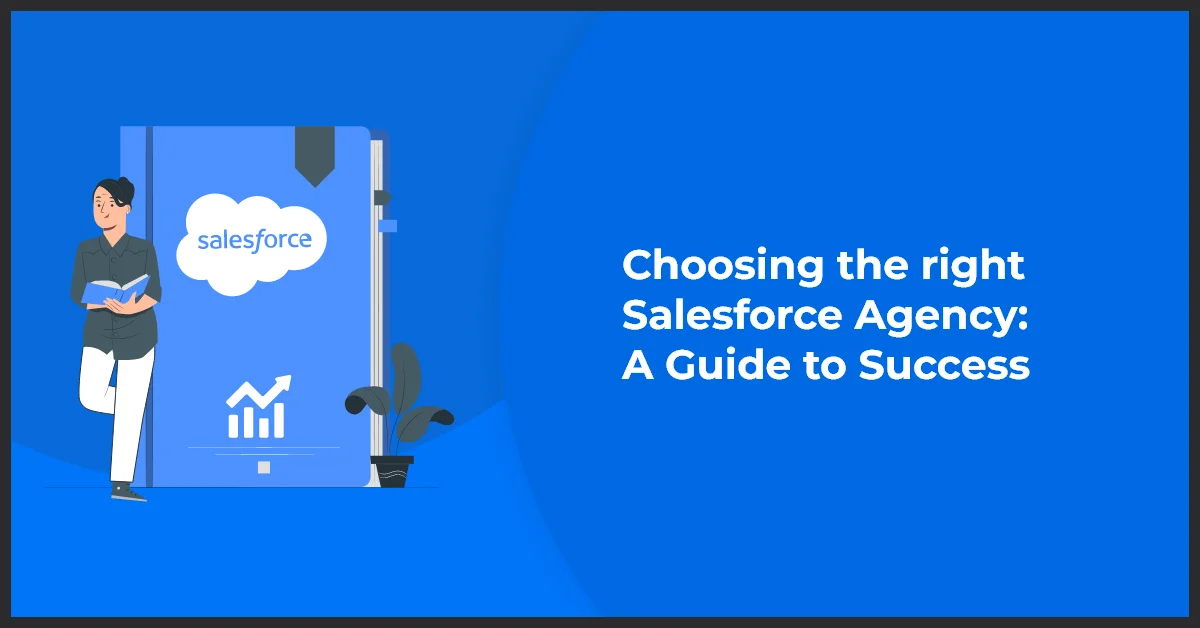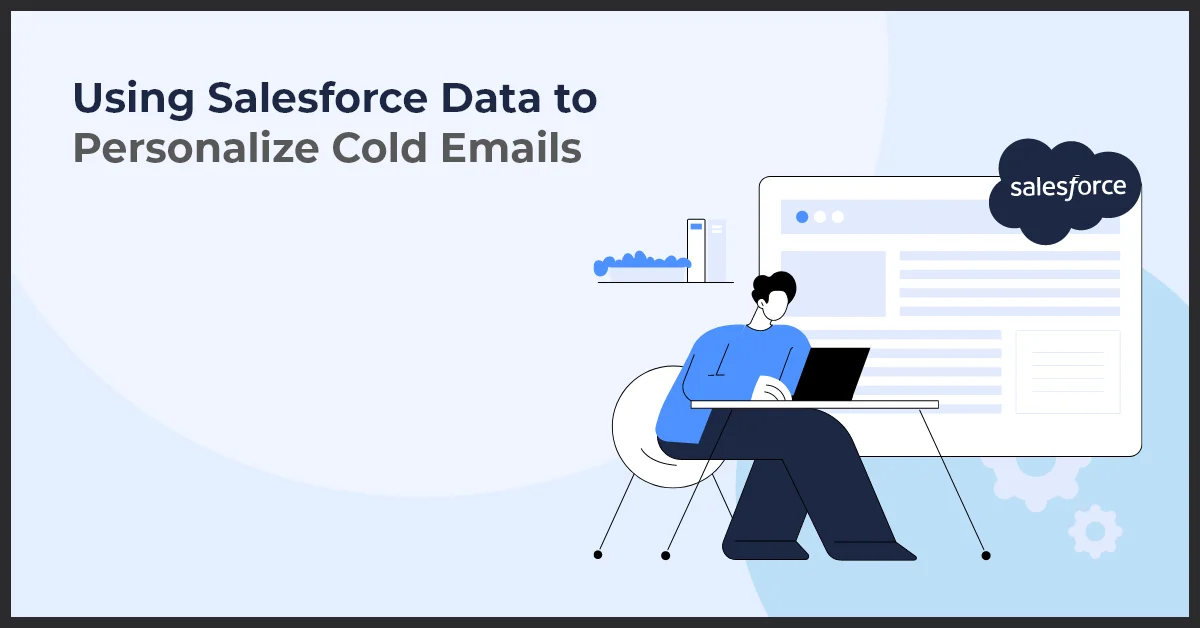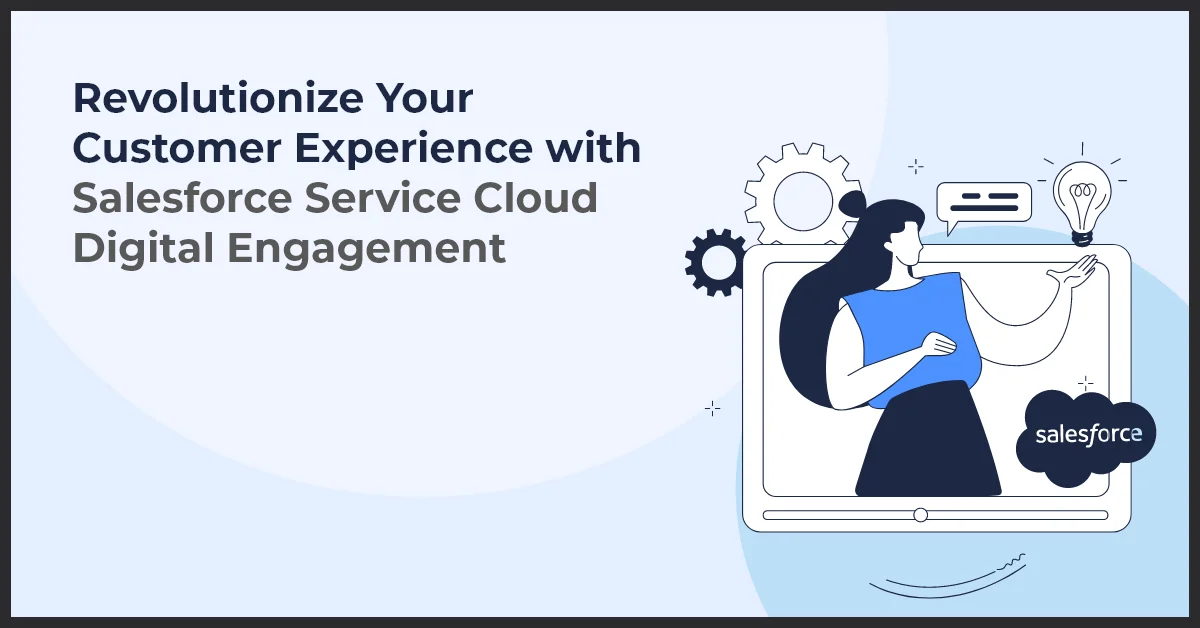Transform Customer Relationships with Salesforce Customer 360

Published on: March 27, 2024
Updated on: January 22, 2025
2234 Views
- Salesforce
21 min read
Customer Relationship Management (CRM) is the cornerstone of any thriving business. CRM systems are the bedrock that underpins customer interactions, ensuring personalized attention and efficient service. Amongst the vanguard of CRM platforms, Salesforce has emerged as a revolutionary force, redefining how businesses engage with their customers.
Salesforce Customer 360 CRM is not just a tool; it's an ecosystem designed to foster exceptional service and unforgettable experiences. By incorporating advanced analytics, automation, and personalized communication channels, Salesforce empowers businesses to elevate customer interactions.
However, the prowess of Salesforce Customer 360 does not merely transcend customer engagement. It is a profound driver of customer loyalty and retention, key metrics that dictate business success in a competitive landscape. By leveraging the insightful data and bespoke services offered by Salesforce, businesses can craft a customer journey that meets expectations and consistently exceeds them.
“Customer 360 unites your marketing, sales, commerce, service, and IT departments with shared, easy-to-understand data on one integrated CRM platform. With a single view of your customer, your teams can create connected, personal customer experiences that build stronger relationships.” –www.salesforce.com
Let's delve into the dynamic ways Salesforce Customer 360 can transform your customer relationships and cement lasting connections.
Salesforce Customer 360: Amplifying Sales Performance
The Salesforce Customer 360 is a beacon of innovation in customer relationship management (CRM). By offering a comprehensive suite of tools designed specifically for sales professionals, it empowers teams to track, analyze, and streamline their sales processes. With Sales Cloud, businesses can seamlessly manage customer interactions, improve collaborations, and close more deals more efficiently.
Enhancing sales strategies with Salesforce CRM features
Unlocking any sales strategy's full potential involves leveraging the cutting-edge features that Salesforce Customer 360 provides. These features include:
- A complete view of the customer, allowing sales reps to make informed decisions based on comprehensive data.
- Automating mundane administrative tasks enables the sales team to focus on building relationships and closing deals.
- Advanced analytics and forecasting tools that give real-time insights into sales performance.
- Mobile accessibility ensures that your sales force remains productive, no matter where they are.
With these powerful capabilities, Salesforce helps sales teams meet and exceed their targets. In essence, Salesforce Customer 360 isn't merely a CRM platform; it's a comprehensive solution that amplifies sales performance and accelerates business growth.
Pro Tip: Utilize Salesforce Customer 360's advanced analytics and forecasting tools to gain real-time insights into sales performance, enabling proactive decision-making and strategic adjustments to effectively meet and exceed sales targets.
Lead Generation and Management: The Salesforce Advantage
Lead generation is the lifeblood of any business seeking to grow and sustain its customer base. In today's fast-paced market, effectively capturing and managing leads is crucial for staying ahead. Salesforce Customer 360 provides businesses with a formidable edge, offering tools to enhance and simplify these processes.
Streamlining Lead Management Processes with Salesforce Customer 360
The complexities of lead management can overwhelm even the most organized teams. Salesforce streamlines these tasks by offering a centralized platform to capture, store, track, and nurture leads with maximized efficiency. Its intuitive design ensures sales teams can swiftly prioritize high-quality leads and move them through the sales pipeline precisely.
Tools and Techniques Within Salesforce for Nurturing Leads
Salesforce is not just about managing leads; it's also about nurturing them. With various tools and techniques, businesses can leverage Salesforce Customer 360 to:
- Engage prospects with personalized communications based on lead behavior and profile data.
- Automate repetitive tasks to ensure no lead is forgotten and each potential customer feels valued.
- Track and analyze customer interactions and campaign performance to refine strategies and create more targeted, effective outreach.
Utilizing these powerful Salesforce Customer features, businesses can transform their lead generation and management processes into a streamlined operation that drives growth and fosters lasting customer relationships.
Pro Tip: Utilize Salesforce Customer 360's personalized communication and automation features to engage leads effectively, ensuring timely follow-ups and nurturing throughout the sales cycle.
Personalization with Salesforce Marketing Cloud
Personalized marketing is no longer just a preference; it's an expectation. Customers demand experiences that align with their preferences, behaviors, and past interactions. This level of personalization is pivotal to cultivating long-lasting relationships and is a cornerstone of an effective marketing strategy.
Creating Personalized Customer Journeys in Salesforce Marketing Cloud
With Salesforce Marketing Cloud, businesses can craft unique customer journeys that resonate personally. This sophisticated platform collects data points from various customer interactions, enabling you to segment your audience and deliver customized messages across multiple channels. Whether email, social media, or mobile, Salesforce integrates each touchpoint to create a seamless customer journey.
Sales Analytics: Measuring Performance and Growth with Salesforce Customer 360
The Salesforce Customer 360 platform understands that the key to business success is not just making sales but understanding how sales happen and what drives their growth. It is where Sales Analytics comes into play, offering deep insights into sales processes and outcomes.
Utilizing Sales Data for Smarter Business Decisions
With a wealth of data available, savvy businesses harness this information to make informed decisions that drive sales efficiency. By analyzing customer interactions, purchase history, and conversion rates, companies can identify trends and opportunities for improvement.
“The Salesforce Customer 360 platform provides a single, authenticated login experience for a company’s websites, e-commerce storefronts, mobile apps and connected products — all while delivering identity analytics and insights on the users taking advantage of the single-login experience.” –martech.org
Analyzing Sales Performance with Salesforce Analytics Tools
Salesforce provides many analytics tools designed to measure every aspect of the sales cycle. From tracking individual rep performance to assessing the overall health of your sales pipeline, Salesforce gives you a comprehensive view of your sales operations.
How Analytics Informs Strategy and Improves Results
Analytics are more than just numbers and charts; they tell a story. By interpreting this data, businesses can refine their sales strategies, focus on the most profitable activities, and tailor their approach to meet customer needs.
- Sales trends: Understand what products or services are trending and why.
- Customer insights: Gain a deeper understanding of your customers and how they buy.
- Forecasting: Predict future sales and market demands to stay ahead of the curve.
- Performance benchmarks: Set and meet realistic targets based on historical and real-time data.
Ultimately, Sales Analytics with Salesforce Customer 360 is indispensable for measuring performance and fostering growth. Turn data into action and ensure that your business remains competitive and customer-centric.
Pro Tip: Regularly analyze sales data with Salesforce Analytics tools to uncover actionable insights such as sales trends, customer insights, and forecasting, enabling strategic decision-making, optimized resource allocation, and ultimately driving sustainable growth for your business.
Elevating Customer Service with Salesforce Customer 360
Transforming customer support with Salesforce Customer 360 is not just about responding to queries; it's about creating an ecosystem where support is swift, insightful, and continuously evolving. By harnessing the power of Salesforce Customer 360, businesses can provide a level of service that truly differentiates them in a competitive market.
Automation Features for Efficient Service Delivery
With Salesforce Customer 360, automation takes center stage. Key features include:
- Automatic case routing to ensure inquiries go to the right agents based on skill set, availability, or other custom criteria.
- AI-driven chatbots provide instant responses to common questions, freeing up valuable time for agents to tackle complex issues.
- Macro actions streamline repetitive tasks, allowing service agents to focus on delivering personalized support.
The result is a more efficient service delivery model where agents can focus on what they do best — resolving customer issues and providing an exceptional service experience. Utilizing Salesforce Customer 360 is not only about enhancing customer support—it's about redefining it. Businesses are setting new benchmarks in customer service excellence by leveraging the platform's extensive capabilities to streamline operations, automate tasks, and deliver insightful analytics.
Salesforce Integration: Connecting Your Tech Stack
Integrating Salesforce Customer 360 with your existing technology ecosystem is a transformative strategy for any business looking to maximize the potential of their CRM investment. Organizations can enjoy a more unified, efficient, and powerful business process by creating a seamless data flow between Salesforce and other critical business platforms.
“Customer 360 goes beyond just sales, service, and marketing. It includes the full range of Salesforce technology – uniting commerce, IT, and analytics – in one connected system.” –www.salesforce.com
Salesforce Data/Statistics representing benefits of using Salesforce Customer 360
- 15% faster sales cycles
- 13% increase in conversions
- 16% faster execution of campaigns
- 11% improvement recorded in customer satisfaction
Benefits of Integrating Third-Party Tools in Salesforce
- Enhanced Productivity: Automate mundane tasks and streamline workflows by connecting Salesforce with productivity apps.
- Improved Data Accuracy: Synchronize data across platforms to ensure consistency and reliability in customer information.
- Personalized Customer Journeys: Deliver targeted marketing campaigns by integrating Salesforce with your marketing automation tools.
- Insightful Analytics: Combine data from disparate sources for richer insights and smarter decision-making.
Exploring Common Integrations and Their Advantages for Service and Marketing
Organizations typically integrate Salesforce Customer 360 with various platforms, including email marketing software, customer service tools, financial systems, etc. Each integration enhances customer understanding, improves service delivery, and creates personalized marketing campaigns that resonate with the target audience.
Step-by-Step Guide to Executing Seamless Integrations
Implementing a successful integration between Salesforce and other tools involves several key steps:
- Identify Business Goals: Start by defining the objectives of the integration.
- Select the Right Tools: Choose third-party tools that align with your business needs and are known for interoperability with Salesforce Customer 360.
- Map the Data: Clearly define how data will transfer between systems for a smooth integration.
- Test the Integration: Before going live, thoroughly test the integration to prevent data loss or disruption in business processes.
- Train Your Team: Ensure your staff are well-equipped to make the most of the new integrated system.
- Monitor and Optimize: Post-integration, continuously monitor the system for any issues and optimize for better performance.
By thoughtfully integrating your tech stack with Salesforce Customer 360, you not only break down data silos but also create a customer-centered ecosystem that drives success across all facets of your organization.
Pro Tip: Prioritize interoperability when selecting third-party tools for integration with Salesforce Customer 360, ensuring seamless data flow and maximizing the efficiency of your business processes.
Artificial Intelligence and the Future of CRM: Einstein AI
Salesforce Einstein AI is the integrated AI within the Salesforce Customer 360 platform, designed to augment the capabilities of customer relationship management (CRM) tools across every aspect of the customer journey. By embedding advanced AI technologies like machine learning, predictive analytics, and natural language processing, Salesforce Einstein transforms vast data into actionable insights and personalized customer experiences.
Realizing the Potential of AI in Enhancing Customer Relationships
Implementing AI in CRM systems is not just a technological advancement; it's a game-changer for customer engagement. Einstein AI equips businesses with the tools to understand their customer base on a deeper level, anticipate customer needs, and deliver services that are not just reactive but also proactive. The predictive prowess of Einstein AI means that businesses can now spot trends, identify opportunities, and mitigate risks earlier than ever before.
Use Cases: Automated Insights, Predictions, and Recommendations for Businesses
- Automated Insights: Einstein AI delves through your customer data to bring forward patterns and insights that might have gone unnoticed, helping you make informed decisions.
- Predictive Scoring: Assess the likelihood of customer actions such as purchases, churn, or engagement with predictive scores, enabling targeted strategies to increase retention and drive revenue growth.
- Recommendations: Personalize customer interactions with AI-driven recommendations that tailor your services to individual needs, fostering stronger, more meaningful connections.
With Einstein AI, Salesforce Customer 360 predicts and shapes CRM's future. It's where smart data meets empathetic customer service, providing businesses with an unprecedented ability to cultivate and maintain customer relationships that are beneficial and enduring.
Safeguarding Your Data: Best Practices in Data Management and Security
In an age where data breaches are not uncommon, the importance of data security in CRM solutions cannot be overstressed. As a business, you handle vast amounts of sensitive customer information daily, making adopting robust data management and protection strategies imperative.
Salesforce's Approach to Data Management and Protection
Salesforce Customer 360 has built a reputation for having a comprehensive approach to data security. Their methodology includes rigorous physical security measures, advanced cybersecurity protocols, and continuous monitoring for potential threats. Salesforce ensures that your data isn't just stored safely and maintains integrity and confidentiality across all processes.
Tips for Maintaining Secure Customer Information
As a business leveraging Salesforce, there are several best practices you should adhere to enhance the security of your customer data further:
- Regularly update access permissions: Review and modify permissions frequently to ensure only authorized individuals can access sensitive data.
- Use strong passwords and two-factor authentication: Enforce complex passwords and introduce two-factor authentication for an extra layer of security.
- Monitor user activity: Monitor user activities and set up alerts for any unusual behavior that could indicate a breach.
- Data encryption: Utilize Salesforce's data encryption capabilities to protect your information at rest and in transit.
- Data backups: Regularly back up your data to prevent loss in the event of an incident.
- Stay updated on security protocols: Educate yourself and your team on the latest security threats and best practices.
Implementing these strategies will reinforce your defenses against potential data breaches and ensure your Salesforce customer information remains secure, fostering trust and compliance in your customer relations management.
Mobile Sales Enablement: Keeping Your Sales Team Empowered On-the-Go
The rise of mobile technology has irreversibly changed how businesses operate, with sales teams now able to perform most of their tasks away from the office. Understanding the trends in mobile sales and their significance for businesses is crucial for maintaining a competitive edge.
Using Salesforce Mobile to Equip Sales Teams for Remote Performance
Salesforce Mobile presents a robust solution for sales representatives working remotely. This powerful app puts the capabilities of the Salesforce Customer 360 platform in the palms of their hands, ensuring they have access to critical data and tools anytime, anywhere. By enhancing productivity with mobile-friendly Salesforce features, sales professionals are never out of touch and can respond quickly to customer needs, maintain relationships, and close deals on the move.
Enhancing Productivity with Mobile-Friendly Salesforce Customer 360 Features
Utilizing Salesforce Mobile equips your sales team with various features to boost efficiency and streamline sales processes. Sales reps can:
- Access and update customer data in real time.
- Manage their pipeline and track deals from anywhere.
- Collaborate with team members via in-app communication.
- Personalize customer interactions with access to historical data and performance analytics.
By empowering your sales force with Salesforce Mobile, you're not just keeping up with mobile sales trends but setting a new standard for on-the-go sales enablement.
Building Community: Leveraging Salesforce Customer Community for Engagement
The Salesforce Customer Community has revolutionized how companies interact with customers, partners, and employees. By creating dedicated platforms for engagement and collaboration, Salesforce enables businesses to build stronger relationships and drive customer success.
The Concept of Salesforce Customer Community for Customer Engagement
At its core, the Salesforce Customer Community is designed to connect people around common interests and objectives, fostering dialogue and sharing insights. These digital spaces allow customers and company representatives to engage with one another, encouraging a feedback-rich environment that can translate into improved products and services.
Strategies for Creating Vibrant, Collaborative Customer Communities
- Personalization: Tailoring the community experience to meet users' needs and preferences can greatly enhance engagement.
- Integration: Connecting the community with other business processes and systems encourages active participation and provides a more cohesive experience.
- Content Strategy: Curating relevant and valuable content can keep members informed and eager to contribute.
- Recognition Programs: Implementing reward systems for active members can incentivize participation and collaboration.
- Analytics and Feedback: Utilizing data to understand user behavior and gather feedback can help constantly refine the community experience.
Master Your Email Marketing Campaigns with Salesforce
As an organization, staying connected with your audience through targeted email campaigns is key to driving engagement and conversions. But with the sheer volume of emails flooding inboxes daily, how can you ensure your message stands out?
Email Marketing in the Age of Salesforce
Today's digital landscape demands smarter email marketing strategies that deliver personalized messages to the right audience at the right time. Salesforce Customer 360 provides the tools to make this possible, enabling you to create impactful emails that resonate with your readers and yield lasting relationships.
Crafting Impactful Email Campaigns with Salesforce Tools
Leveraging Salesforce's comprehensive suite of marketing tools, you have the power to craft emails that not only look great but are also fine-tuned to meet your business goals. Salesforce's rich feature set allows for dynamic content personalization, automated journey mapping, and intricate segmentation to tailor each campaign to your audience's preferences.
A/B Testing and Analytics for Continuous Email Strategy Optimization
Its robust analytics and A/B testing capabilities set Salesforce Customer 360 apart in email marketing. By rigorously analyzing your email performance data and testing variations of your campaigns, Salesforce empowers you to refine your approach continuously. This results in higher open rates, better engagement, and a greater return on email marketing investments.
- A/B testing: Experiment with different subject lines of email content and send times to discover what drives the best results.
- Analytics: Measure your success with real-time analytics tracking opens, clicks, and conversions to inform your future campaigns.
- Optimization: Use Salesforce Customer 360's insights to continually hone your email strategy and stay ahead of the curve.
Embrace the full potential of email marketing as an expert marketing professional. Utilize these tools to connect with your audience more meaningfully and watch your business thrive through improved customer engagement and loyalty.
Pro Tip: Continuously leverage Salesforce Customer 360's A/B testing and analytics features to optimize your email marketing campaigns, ensuring they resonate with your audience, drive higher engagement, and ultimately lead to improved customer loyalty and business success.
The New Wave of Collaborative Selling: Salesforce Chatter
Salesforce Chatter represents a revolutionary approach to engaging in sales conversations and strategizing within the sales process. As businesses strive for a more connected and informed workforce, Chatter is the backbone of a new era of collaborative selling.
Introducing Collaborative Selling with Salesforce Chatter
Salesforce Chatter transcends traditional communication barriers by offering a real-time platform for sales teams to discuss deals, share insights, and solve problems. With Chatter, the entire organization can contribute to the sales process, fostering a community centered around collective success.
Encouraging Team Collaboration and Knowledge Sharing
Chatter promotes a culture where information and expertise are openly shared. Knowledge sharing through Chatter feeds enables team members to learn from one another, harness the power of the group, and deliver consistent messaging to prospects and customers alike.
- Instantly share updates and insights.
- Access valuable resources and documents
- Tap into the expertise of the whole organization.
Linking Collaborative Efforts to Improved Customer Service and Sales Results
The synergy created through Chatter's collaborative environment directly correlates with enhanced customer service and sales outcomes. Communication within Salesforce Chatter enables teams to deliver faster responses, drive innovative solutions, and personalize the customer experience, increasing customer satisfaction and sales performance.
By leveraging the power of Chatter, businesses are not only streamlining internal communication but also reinventing how they connect with their customers.
Optimize Your CRM to Meet Unique Business Demands with Salesforce Lightning Customization
Salesforce Customer 360 knows that a one-size-fits-all approach rarely matches the nuanced needs of different businesses. That's where the power of customization within Salesforce Lightning comes to the forefront, enabling users to tailor the CRM experience precisely to their unique business processes and goals.
Tailoring Salesforce Lightning for Unique Business Needs
To create a CRM environment that aligns with your daily operations, Salesforce Lightning provides a suite of customization options. Through its intuitive interface, you can modify page layouts, add custom components, and even leverage AppExchange apps to craft a Salesforce experience designed for your organizational requirements.
Personalization Techniques to Refine User and Customer Experiences
Every interaction in your CRM can be a touchpoint that enhances user and customer satisfaction. By utilizing Salesforce Lightning's personalization techniques, such as record pages tailored to specific roles or industries, you ensure every team member has quick access to the most pertinent information, thus enriching the overall customer experience.
Guide to Customizations That Drive Productivity and Customer Satisfaction
Driving productivity and customer satisfaction is the holy grail of CRM adaptation. Here's a straightforward guide to help you get started with Salesforce Lightning customization:
- Define Your Objectives: Outline clear goals for your CRM customization to support sales, service, or marketing needs.
- Analyze User Feedback: Incorporate feedback from those using the system daily to ensure practical enhancements.
- Leverage Drag-and-Drop Tools: Use Salesforce Lightning's drag-and-drop interface to restructure the user interface without coding.
- Adopt Automation Where Possible: Streamline processes by automating tasks and workflows to reduce manual input and errors.
- Test and Iterate: Continuously test new customizations in a sandbox environment and iterate based on results and user feedback.
Incorporating these customizations in your Salesforce Lightning platform increases your team's efficiency and significantly boosts your customers' satisfaction by providing them with a seamless and personalized experience.
Pro Tip: Prioritize user feedback and iterative testing when customizing Salesforce Lightning to meet your unique business demands, ensuring that your CRM environment aligns with your team's needs and drives continuous improvement in productivity and customer satisfaction.
Maximize Your Business Potential with Salesforce Customer 360 Integration
As we conclude our comprehensive exploration of Salesforce Customer 360 and its multifaceted applications, we reflect on its transformative potential for sales and marketing strategies. The advantages of leveraging Salesforce to enhance customer experiences are clear: increased efficiency, improved customer insights, and the ability to deliver personalized interactions at scale.
Salesforce Customer 360 is not just a solution but a strategic partner that can revolutionize how you connect with customers—from the initial lead generation phase through personalized marketing journeys and concluding with after-sales service that fosters loyalty and advocacy.
“Marketers are striving to streamline their customer journey — an effort that arguably begins with the strength of a company’s CRM system. By pulling together data manager, identity, privacy governance, and soon, the Audience 360 solution, Salesforce offers a treasure trove of capabilities within its already well-established CRM platform.” –martech.org
Why is Salesforce Customer 360 Essential for Today's Sales and Marketing Professions?
- Sales Cloud streamlines your sales process and gives you the power to close deals faster.
- Marketing Cloud allows you to create a tailored customer journey for each interaction.
- Service Cloud lifts your customer service to new heights, ensuring satisfaction and retention.
- Einstein AI arms you with predictive analytics, propelling your decision-making capabilities forward.
- Salesforce Communities enables you to build a collaborative space for customers and partners, enhancing engagement.
The accessibility and integrative nature of Salesforce Customer 360 make it a compelling choice for businesses looking to upgrade their sales and marketing tactics and positively impact their bottom line. Adopting Salesforce isn't just an upgrade; it's a redefinition of how your business engages with its most valuable asset: the customer.
Key Takeaways
- Salesforce Customer 360 revolutionizes customer relationship management by offering a holistic ecosystem for personalized interactions, driving customer loyalty and retention.
- With Salesforce Customer 360, businesses can amplify sales performance through tools like Sales Cloud, lead generation and management capabilities, and deep insights from Sales Analytics.
- Personalization is key to effective marketing, and Salesforce Customer 360 empowers businesses to deliver tailored experiences through Salesforce Marketing Cloud, enhancing customer engagement and loyalty.
- Integration with existing tech stacks, leveraging AI capabilities with Salesforce Einstein, ensuring data security, and enabling mobile sales empowerment are critical aspects that Salesforce Customer 360 offers to maximize business potential and customer success.
Conclusion
We encourage every sales and marketing professional to consider the potential that Salesforce Customer 360 integration brings to the table. The time is now to innovate, to digitize, and to personalize. Don't just meet your customers' expectations—exceed them.
Take the step. Integrate Salesforce into your sales and marketing strategy, and watch your business soar. The opportunities are boundless, and Salesforce Customer 360 is the key to unlocking them.
Are you ready to revolutionize your customer engagement? Harness the power of Salesforce Customer 360 with Growth natives and take your business to new heights today. Write to us at info@growthatives.com to learn more.
Citations/Sites Referred:
https://www.salesforce.com/in/products/ https://www.salesforce.com/ap/blog/what-is-salesforce-customer-360/
https://martech.org/saleforce-360-truth-designed-to-deliver-a-connected-continuous-customer-experience/
Frequently Asked Questions
Salesforce helps sales by providing a comprehensive platform for managing customer relationships, automating sales processes, tracking leads and opportunities, and analyzing sales performance through its Sales Cloud offering.
Salesforce Customer 360 is powered by a unified data model that connects customer data across sales, service, marketing, and more, enabling businesses to have a complete view of their customers and deliver personalized experiences across all touchpoints.
The Salesforce customer community is a platform that allows businesses to create online communities for their customers, partners, and employees to connect, collaborate, and access resources such as support, knowledge articles, and training materials.
The Salesforce customer data platform (CDP) is a tool that enables businesses to collect, unify, and activate customer data from multiple sources in real-time, empowering them to create personalized experiences and make data-driven decisions across marketing, sales, and service efforts.



